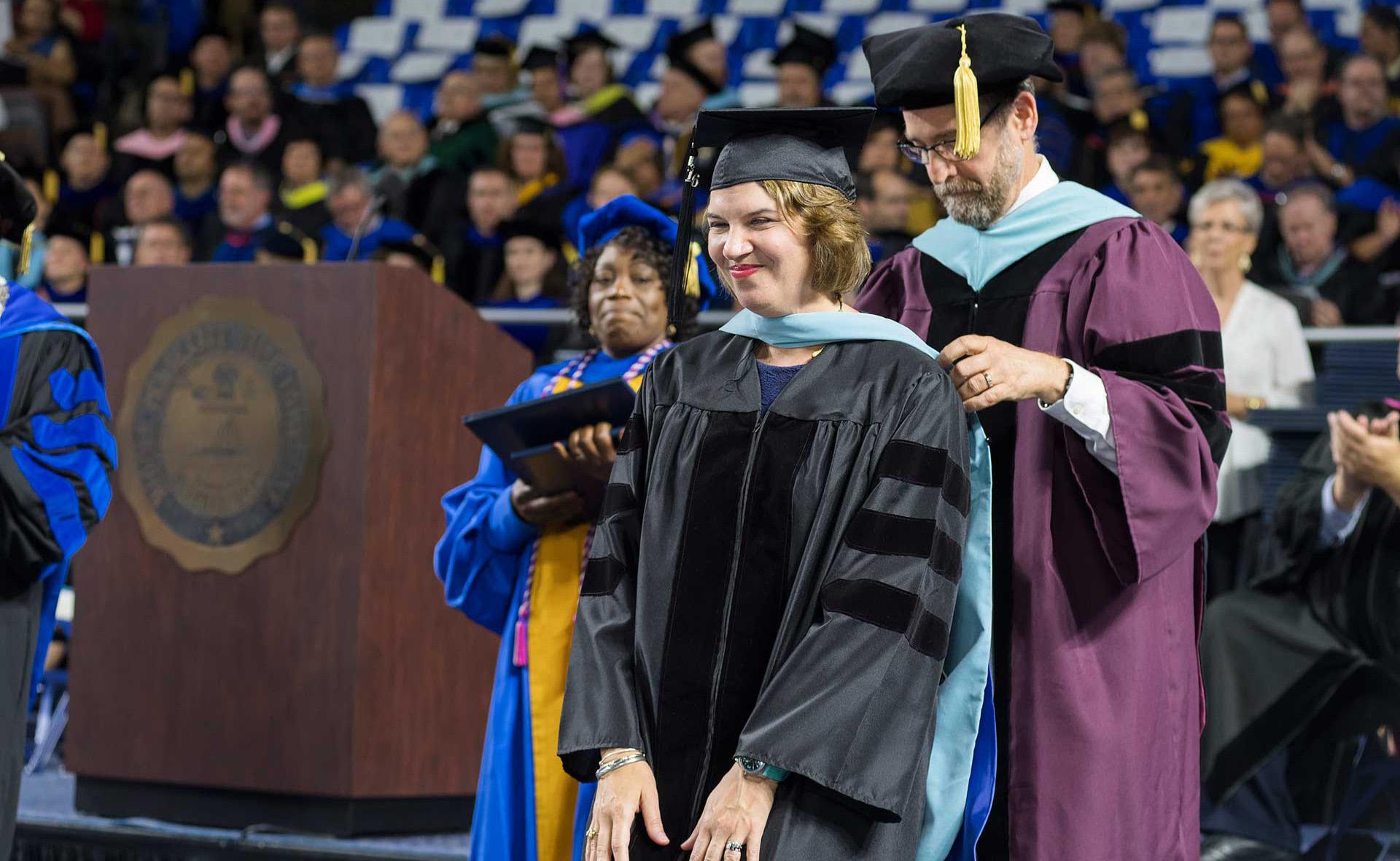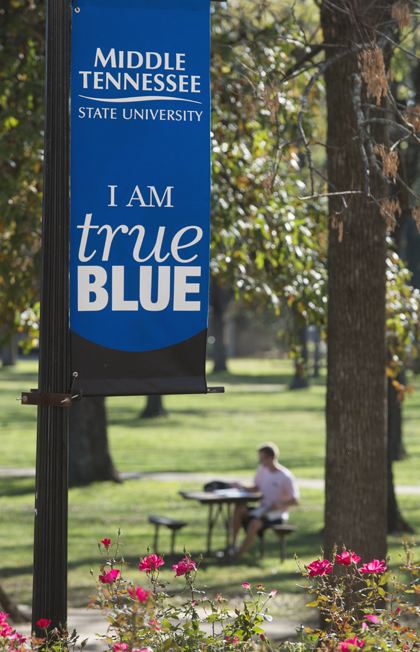
Assessment, Learning, and Student Success
Ed.D. with a K12 & Higher Ed concentrations. Enhance student learning, practical application.
Assessment, Learning, and Student Success, School Improvement Concentration, Ed.D.
The Ed.D. in Assessment, Learning, and Student Success is a doctoral program capitalizing on faculty expertise in the College of Education and across the University. The program provides a structured curriculum with early development and ongoing support for students as they work to complete their doctoral dissertations. The Ed.D. in Assessment, Learning, and Student Success has two concentrations: School Improvement and Higher Education.
The K12 concentration offers research-based knowledge, analytical skills, and practical application to enhance student learning, increase assessment scores, and improve schools. This is not a program you learn about now and do someday; in the ALSS program's K-12 concentration, you will integrate your learning directly into your setting in a job-embedded professional development approach. Educators who want to make an immediate difference in the lives of K-12 students are attracted to the program and the opportunity to participate in projects that result in direct improvements. The cohort-based doctoral program provides a structured curriculum that considers that most students are employed during their studies. Participants benefit from the support and collegiality of their cohorts.
The concentration in School Improvement is designed to:
- meet a specific need to develop the capacity of PreK-12 school leaders (including teacher-leaders and education leaders across the range of policy and non-profit agencies),
- significantly improve student academic achievement, and
- meet increased accountability mandates.
This degree will provide educational leaders with the knowledge and analytical skills to analyze all forms of student-learning data (formative and summative, quantitative and qualitative) in order to accurately identify initiatives that will improve their students' success.
If you live in one of these states: AL; you may be able to attend MTSU at in-state rates under the Academic Common Market program.
News Briefs

Program grads become true change agents
"The ALSI program has been transformative for me, both professionally and personally," says Lando Carter, a member of the first Assessment, Learning, and School Improvement cohort, graduating in August 2016. "This program is unique because the instructors purposefully fuse assessment, learning, and school improvement to help school leaders of all backgrounds become true change agents, ones who seek substantive and lasting change in their classrooms, schools, or districts." Carter, who teaches high school English in Rutherford County, says the cohort model creates a meaningful family atmosphere during the three years of coursework. "Now I'm watching the program work in my classroom and my school on a daily basis," says Carter, who built on an ALSI project to start a popular writing lab at Central Magnet School, modeled after MTSU's Writing Center. He says he program works because I've been given the tools and the training to consistently move from theory to practice. I am indebted to the expert faculty not only for building such an innovative program but also for the guidance they provided during and after my time as an ALSI student."

Explore new ways to impact instruction and learning
Tracy Hollinger was in her fourth year as principal of Northeast Middle School when she decided she could balance the time, commitment, and workload of her demanding job and the stress of pursuing a doctorate. "I was leading others, but I was certainly feeling the need to challenge myself and grow in my own knowledge and skills as an instructional leader," she recalls. When she looked at doctoral programs, she discovered that MTSU had a new program in Assessment, Learning, and School Improvement. "Having received my bachelor's degree at MTSU, I knew firsthand the quality of the education programs. The ALSI program was exactly what I was looking for — designed from current research, focused on job-embedded application, and with a distinct focus on student learning and school improvement." Hollinger says the program impacted her daily work "in profound ways,' such as the utilization of new resources and processes for examining progress, needs, and strengths in developing a school improvement plan. "I highly recommend this program for those interested in expanding their knowledge and skills, examining current educational research, and exploring new ways to impact instruction and learning in all levels and roles," she concludes.
News Briefs
Program grads become true change agents

"The ALSI program has been transformative for me, both professionally and personally," says Lando Carter, a member of the first Assessment, Learning, and School Improvement cohort, graduating in August 2016. "This program is unique because the instructors purposefully fuse assessment, learning, and school improvement to help school leaders of all backgrounds become true change agents, ones who seek substantive and lasting change in their classrooms, schools, or districts." Carter, who teaches high school English in Rutherford County, says the cohort model creates a meaningful family atmosphere during the three years of coursework. "Now I'm watching the program work in my classroom and my school on a daily basis," says Carter, who built on an ALSI project to start a popular writing lab at Central Magnet School, modeled after MTSU's Writing Center. He says he program works because I've been given the tools and the training to consistently move from theory to practice. I am indebted to the expert faculty not only for building such an innovative program but also for the guidance they provided during and after my time as an ALSI student."
Explore new ways to impact instruction and learning

Tracy Hollinger was in her fourth year as principal of Northeast Middle School when she decided she could balance the time, commitment, and workload of her demanding job and the stress of pursuing a doctorate. "I was leading others, but I was certainly feeling the need to challenge myself and grow in my own knowledge and skills as an instructional leader," she recalls. When she looked at doctoral programs, she discovered that MTSU had a new program in Assessment, Learning, and School Improvement. "Having received my bachelor's degree at MTSU, I knew firsthand the quality of the education programs. The ALSI program was exactly what I was looking for — designed from current research, focused on job-embedded application, and with a distinct focus on student learning and school improvement." Hollinger says the program impacted her daily work "in profound ways,' such as the utilization of new resources and processes for examining progress, needs, and strengths in developing a school improvement plan. "I highly recommend this program for those interested in expanding their knowledge and skills, examining current educational research, and exploring new ways to impact instruction and learning in all levels and roles," she concludes.
Related Media

The Ed.D. in Assessment, Learning, and Student Success is designed to meet a specific need to develop the capacity of existing Pre-K-12 school leaders (including teacher-leaders)and those in education-related careers to significantly improve student academic achievement and to meet increased accountability mandates.
Program graduates may also find work in:
- Higher education
- Research
- Educational policy
- Governmental agencies
- Not-for-profit and philanthropic organizations
- Professional development consulting, which will also contribute to improved student and school achievement.



MTSU's doctorate in Assessment, Learning, and Student Success became a reality after more than 40 years of working for a program that focuses on improving K-12 teaching and learning. This unique program is designed to meet a specific need to develop capabilities of existing school leaders, in formal and informal leadership roles.
The program offers research-based knowledge, analytical skills, and practical application to enhance student learning, increase assessment scores, and improve schools. This is not a program you learn about now and do some day; in the ALSS program's K-12 concentration you will integrate your learning directly into your setting in a job-embedded professional development approach.
Educators who want to make an immediate difference in the lives of K-12 students are attracted to the program and the opportunity to participate in projects that result in direct improvements. The cohort-based doctoral program provides a structured curriculum that considers that most students are employed during their studies. Participants benefit from the support and collegiality of their cohorts.
Live outside of Tennessee? You could be eligible for in-state tuition and save thousands of dollars.

CONTACT US

Please fill in the form below and we will contact you very soon










